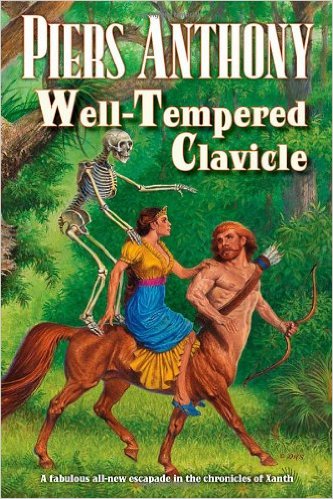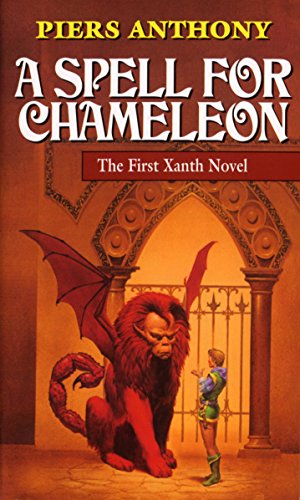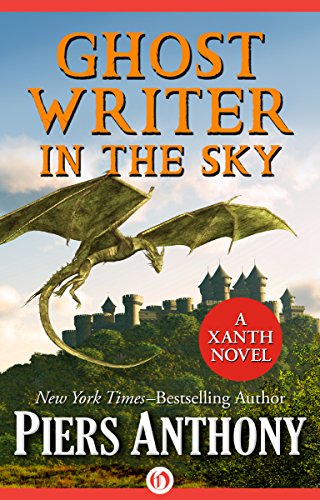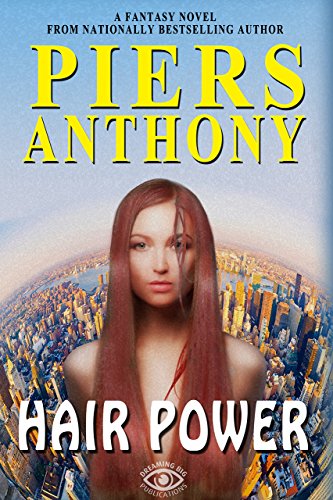It’s not everyday that you get to talk to one of your heroes. Which is why I was honored to conduct an interview with none other than bestselling author Piers Anthony. Known for creating hugely popular series such as Xanth and Incarnations of Immortality, no fewer than 21 of his books became New York Times bestsellers. In the following conversation, we discuss everything from how he envisions the perfect Xanth movie right down to how he gets inspiration for the literally hundreds of stores that he’s published over the years.
You can stay updated with Mr. Anthony on his official website. Also be sure to head over to his Amazon page to buy some of his magnificent books.
He started off with a fun little jab at the title of our site:
Cultured Vultures? I have heard of cultured plants and cultured fish, but I didn’t realize they did the same for vultures. In my day, circa the 1960s, we had circular correspondences, maybe six people sending packages of letters around, round robin, each person deleting his prior letter and inserting a new one responding to the others. Sometimes a circuit would catch fire, generating huge letters with phenomenal global revelations, and was said to have gone Vulture. Maybe this is like that.
The Xanth series has now spanned an incredible 40 novels over the course of 39 years. As the series was originally conceived to be a trilogy, are you particularly surprised by this milestone?
The Xanth series is actually now 42 novels, the last two still in the pipeline, and I am making notes for #43, Jest Right, about a comedienne no one takes seriously. #1, A Spell for Chameleon, was to be a singleton novel. When the editor asked for more fantasy from me—I had been a science fiction writer—I pondered and realized that I had more to say about the Land of Xanth, so I wrote a sequel, then a third. Then fan responses started coming in. I have done many series, so this wasn’t surprising. What was surprising was how successful it became.

How do you feel about how the series has evolved over the years? For example, later books put much more emphasis on puns than those at the start. Do you think that there were any other significant changes over time?
Xanth has indeed evolved. After the second, I had a new main character for each novel, and that made it open ended. Xanth was humorous because I just couldn’t take fantasy seriously, and puns came naturally. Then readers started sending them in. The editor, would you believe, didn’t like the puns; he even chopped out the whole first chapter of Crewel Lye because it had too many puns. Here is news that may surprise publishers: if you want to keep an author, don’t do meat-cleaver editing. Xanth soon found a new home, puns and all. But despite its humor, in contrast to my other fantasy series (I did learn to take it seriously), each Xanth novel has a different underlying story featuring folk with feelings. It has gradually gotten more serious, and it was never conceived as juvenile fiction, for all that juveniles of any age love it. Race was peripherally tackled in Zombie Lover, for example; the lead character is a militantly black girl who even wears black panties, pursued by an amorous zombie king. A key scene there is when she says that zombies are all right in their place, but she wouldn’t want to marry one. Then she pauses… The latest novels are cautiously addressing homosexuality, with gay and lesbian characters appearing and not played for laughs, at least not for that reason. Many readers may not realize that the main character in Esrever Doom is gay. More is coming. And yes, I am losing readers because of it. I hope I am also gaining readers because of it.

There’s been talk of a Xanth film adaptation for some time. Can you give an update on its status?
Xanth has been optioned several times for a movie or TV series. A studio or entrepreneur buys the right to make, say, a movie, for a year or so. If the option is exercised, then the movie is on. So far none has been exercised. The latest one is at the decision point now. I’d love to have the TV series it promises, but the decision is not in my hands. So it’s a definite maybe.
How do you envision a perfect Xanth movie?
Here’s the thing about movies: the author is advised to take the money and run. That’s because they come bearing barrels of cash, but you know the movie will bear only coincidental similarity to the book. So for me the perfect movie is any big budget effort. Then viewers can get and read the actual novel to see what I wrote before the termites got into it, while I bask like Scrooge McDuck in a swimming pool full of money.
My personal favorite novel in the series is Demon’s Don’t Dream, because I read it when I was a teenager obsessed with fantasy and videogames. How did you find the process of writing the book in conjunction with the development of the Companions of Xanth game?
The official line on Xanth is that only the first novel was any good and the rest are derivative nonsense. But for every reader, the first one read is the favorite. One reader even read the first ten or so in backwards order, and reported sadly that Xanth #1 was not up to the quality of the others. So you are typical. The fact is, when I write I am in the scene, and it plays out in my mind like a real story or a game. So I had no problem with the game in that respect. What I did have a problem with was that when I tried to advise the game makers how to make a really successful game, they dismissed me as ignorant and did it their way. If I am ignorant about Xanth and its market, who is knowledgeable? They made a sequel game, keeping me totally out of the picture—and never published it. That’s not the only game I’ve been involved with, but the attitude is typical; my conclusion is that as with Hollywood, there are crazy folk there who could profit if they took a moment to address the interests of their market, as I try to do. Sigh. As with politics, it is best played as a spectator sport, lest you get burned.

This may seem like an odd question, but as the shape of the land of Xanth is based on Florida, I always wondered if it was also the same size as Florida (170,304 km²)?
When I wrote the first Xanth novel I didn’t realize I was basing it on Florida, though I had elements taken from my local scene and made magic; it was unconscious. This reminds me of a section of a poem by the great American Sidney Lanier that I quoted in my novel Macroscope: “What the cloud doeth, the Lord knoweth; the cloud knoweth not. What the artist doeth, the Lord knoweth; knoweth the artist not?” I knew not. When I finally did realize, I made the most of it. Yes, Xanth and Florida are the same size. They differ mainly in that Xanth has magic and Florida has cities.
Also, as puns are such a huge part of the series, are they also a part of your daily life?
Puns are a small part of my daily life. Most of the ones in Xanth are from my readers. Which answers the question you didn’t ask: where do I get my ideas? From my readers. Duh.
Would you encourage newcomers to the series to read the original version of A Spell for Chameleon or the new simplified version?
That’s difficult to answer. My editor felt that my novel could be mistaken for a juvenile, and he didn’t want that. So I upgraded the language. Instead of “high place” I made it “lofty promontory.” That sort of thing, throughout. It didn’t fool the juveniles; they complained about having to go to the dictionary so often, but they loved Xanth. Years later a reader made a language-simplified version that folk with learning handicaps could more comfortably read. I went over it, and finally made a deal with the publisher: it became the electronic edition. That’s probably closer to the spirit of the original, once the reality of the juvenile readership was accepted. Read the one you prefer.

Whilst many of your works are suitable for all ages, you’ve also written some books that are most definitely not for kids. Pornucopia, The Sopaths, Firefly and Eroma immediately come to mind in this area. Does it feel refreshing to occasionally throw common decency out the window and to unleash your wild side?
Not to mention Volk, with a Nazi SS officer as the protagonist, sympathetically portrayed, that I could not get published and finally self published at Xlibris. It tells uncomfortable truths about America that Americans don’t want to hear. I’m politically and socially liberal, and I like to think that liberals are open minded, but that showed me how close minded they could be. It’s not just sex that freaks folk out. I can see how a title like The Magic Fart might upset some folk. My interest is in the truth, always, whatever it may be. There are truths in all my novels, but it would be difficult to do justice to the theme of The Sopaths in Xanth. That, for those who don’t want to dirty their minds on controversial material, is that the human soul is responsible for our better nature, and when the supply of souls runs out because of overpopulation, children start appearing without souls, and they are little terrors who will do anything to get what they want, violence and sex not excluded. It’s ugly. I don’t write such books to feel wild, but rather because I refuse to be limited to the conventional rut.
Have you written any less well known books that you would like to give a shout out to?
Some of my most important work is less well known, because of that refusal to be limited. Such as Tatham Mound, which shows the exploration of America by Hernando de Soto from the perspective of the natives there, and it’s not pretty. He had dogs trained to bite off the genitals of those who did not tell where the gold was hidden, and there was no gold. Like Tarot, which was broken into three parts published separately by the publishers, an exploration of religion, of which I say if you can read it and not be offended at some point, you probably don’t understand it. It starts with the monk Brother Paul being assigned to go to a far planet to ascertain whether what has manifested there is or is not God. He has to make his way through a sometimes literal Hell. Macroscope, where they get into what might be called the Internet of the Galaxy, written before there was an Earthly Internet. The GEODYSSEY historical series, where it seems as if a single family exists for the past eight million years, experiencing the significant development of our species, such as why women, unlike other animals, have permanent breasts and why people have lockable knees; I regard that series as my most significant writing. The ChroMagic series, my most significant fantasy. That starts with Havoc, a talented young man ready to marry his girlfriend Gale, when he gets abducted in order to compete to be the next planetary monarch. He wins, and we have a wild and angry barbarian as king. No, that’s not based on recent American politics.
With all the different mediums of storytelling available these days, do you feel that prose fiction will always have a place in today’s world?
Yes.

So many writers and publishers are obsessed with tapping into the zeitgeist and trying to mimic what’s popular instead of doing their own thing. How do you feel about this?
This is a consequence of having the arts commercialized. The authors, artists, dancers and other creative folk want to express themselves and make beauty in the world, but the publishers want to make money. So the artistic folk have to cater to the greed-heads, or starve. It’s a shame. I am a commercial writer; I learned how to hit the buttons and produce popular fiction, but I don’t respect the system. Now that I have made my fortune, I am damn well writing what I please. Fortunately what pleases me also pleases a good many readers.
You’ve tackled all kinds of genres throughout your incredible career. Do you prefer writing specific genres or does the story choose itself?
I have an affinity for science fiction and fantasy, but again, I don’t want to be limited to it. So yes, the story pretty well defines the genre.
How do you get the inspiration for so many stories? And how would you advise people suffering from writer’s block?
Imagination is integral to my nature; I am constantly thinking of new things. I have so many ideas I can’t keep up with them. So I summarize them in a voluminous—it’s three hundred thousand words long—computer file, and draw on it when I need notions for stories or novels. I can’t tell others how to get that kind of mind if they don’t already have it, but I can say that a writer can fake it by adaptation: see a house, think of a difference. Suppose that house were alive, its windows eyes. Something perfectly mundane has generated something extraordinary. See a girl, imagine that her cleavage connects to her legs under her clothing, and that she actually has parallel bodies connecting only at the head. See an ordinary brick, imagine it with an extra hole on one side: that produced Noah’s Brick. Any ordinary thing can became amazing, with a small imaginary change. As for Writer’s Block: I learned early on in Drama that I could not afford to have stage fright, so I learned to get over it; my time as a teacher really helped there. Similarly I realized that to be a commercial writer I could not afford Block, so I worked at a way to avoid it and never suffered from it since. I call it my bracket system, dating from when I wrote my first drafts in pencil, because with a hyperactive child to care for I could not stay at the typewriter. When I came to a halt in the narrative, I put in brackets and discussed the problem with myself. He took her into his arms. “I– [what is the continuation? My mind is blank. Is she ill? No, maybe he wants to tell her something. What would that be? That it is time to take out the garbage? Or maybe something more romantic? Ah, try that.] love you,” he said. Then in the final draft, eliminate the bracket material; it has served its purpose. Today I use a separate computer notes file, same purpose. Sometimes I have a hundred words of text and a thousand words of notes. Whatever it takes. The point is to keep writing, either text or notes, until you get there. I tried to describe this once to another writer, but he wasn’t interested. So he continued to suffer from Block while I didn’t. To each his own.

You’ve written literally hundreds of books. In a single year, you often publish more than many other bestselling authors will release in a lifetime. For instance, in 2016 alone you’ve released Service Goat, Hair Power, Pira, Captive, Soul of the Cell, Noah’s Brick and Writer’s Retreat. Is this something you set out to achieve, or does such an impressive workload just come naturally?
Yes, and Hair Suite about to appear, and next year I’ll write Hair Peace. I believe my count of published books, as of the end of this year, is about 185, with more in the pipeline. I am a workaholic, or maybe writaholic. It’s a bit like breathing; I can’t hold off from it long. I actually schedule time off for correspondence, games, DVD movies, books to read, household chores and so on. So with the greater availability of markets that the Internet facilitates, I can get most of what I write published. Unlike some writers, I love to write, and that hasn’t faded with age. I am now 82 and still going strong. When I die I expect to be halfway through a great novel.
Can you describe your daily writing schedule?
It’s haphazard. My wife of 60 years is infirm, so I have taken over most of the meals, dishes, and housework, and I push her around the grocery store in a wheelchair. She can walk, but not for long. I exercise regularly. So my writing time is fitted in around the necessary chores of life. I generally get in two to three hours in the morning, a similar amount in the afternoon, and an hour or so in the evening. But correspondence cuts into that, and yes, this interview comes out of my working time. Between novels I like to watch movies on DVD. So I write when I can, and it’s not a lot, but is fairly steady. I don’t take vacations and I seldom leave the house, so it does add up, one to two thousand words a day. It reminds me of when I was a teen, we were visiting Florida from Pennsylvania, a thousand mile drive. Our car zoomed along at 50 or 60 miles an hour, passing a car that was breaking in its motor doing a steady 25 mph. We would stop for a meal, and resume. We kept passing that same car, and I realized that it was making the same average speed we were. It didn’t stop. You can make good time slowly, if you don’t stop. I’m doing that now.
 I’ve met a few people who say that reading fiction is a waste of time. Their argument is usually something along the lines of “Why would you want to read about stuff that didn’t actually happen when you could read about stuff that did?” What would you say to such people?
I’ve met a few people who say that reading fiction is a waste of time. Their argument is usually something along the lines of “Why would you want to read about stuff that didn’t actually happen when you could read about stuff that did?” What would you say to such people?
Such folk must lead desolate lives. Imagination is vital to the human condition. That’s why people love stories, and the modern TV programming is that in a contemporary guise. Folk can escape their dull existences for a while by immersing their attention in stories crafted to divert them. I am now watching the collected three seasons of a series called Necessary Roughness, about a woman trained as a therapist who finds herself with a whole professional football team as a client, while she struggles to raise her two teenagers. It’s fascinating. I’m a longtime pro writer, but I find it a pleasant diversion. Stories have power.
Do you have a favorite quote from any of your books?
It might be a statement by Queen Irene of Xanth: “Never let a man get the upper hand; there’s no telling where he might put it.” I’m sure women know exactly what she means.
Can you talk about your upcoming projects?
Next month I expect to write a novella Self Image, about a boy who seeks an imaginary friend, and finds one, but she’s a girl with a mind of her own. How can that be? Well, she’s actually a telepathic projection of a lonely real girl who can’t meet folk physically, but becomes his friend this way. Much more follows. Then next year I will write the one mentioned in Answer #1, Xanth #43 Jest Right. She says that no one takes her seriously. When she told her boyfriend she loved him and wanted to marry him, he laughed his head off. “Here it is,” she says, pulling a laughing mannikin head out of a bag. More to follow.
Some of the coverage you find on Cultured Vultures contains affiliate links, which provide us with small commissions based on purchases made from visiting our site. We cover gaming news, movie reviews, wrestling and much more.


